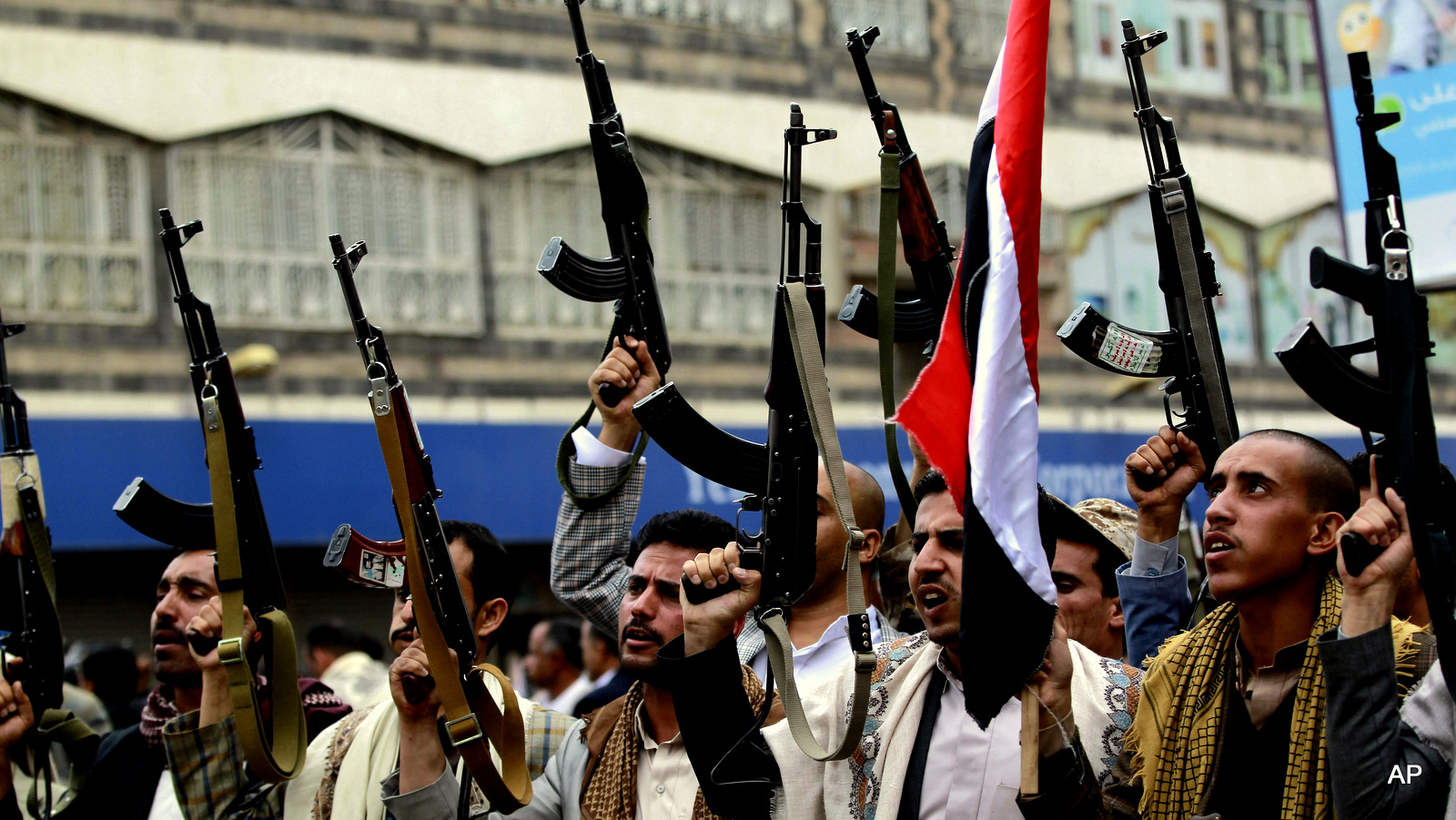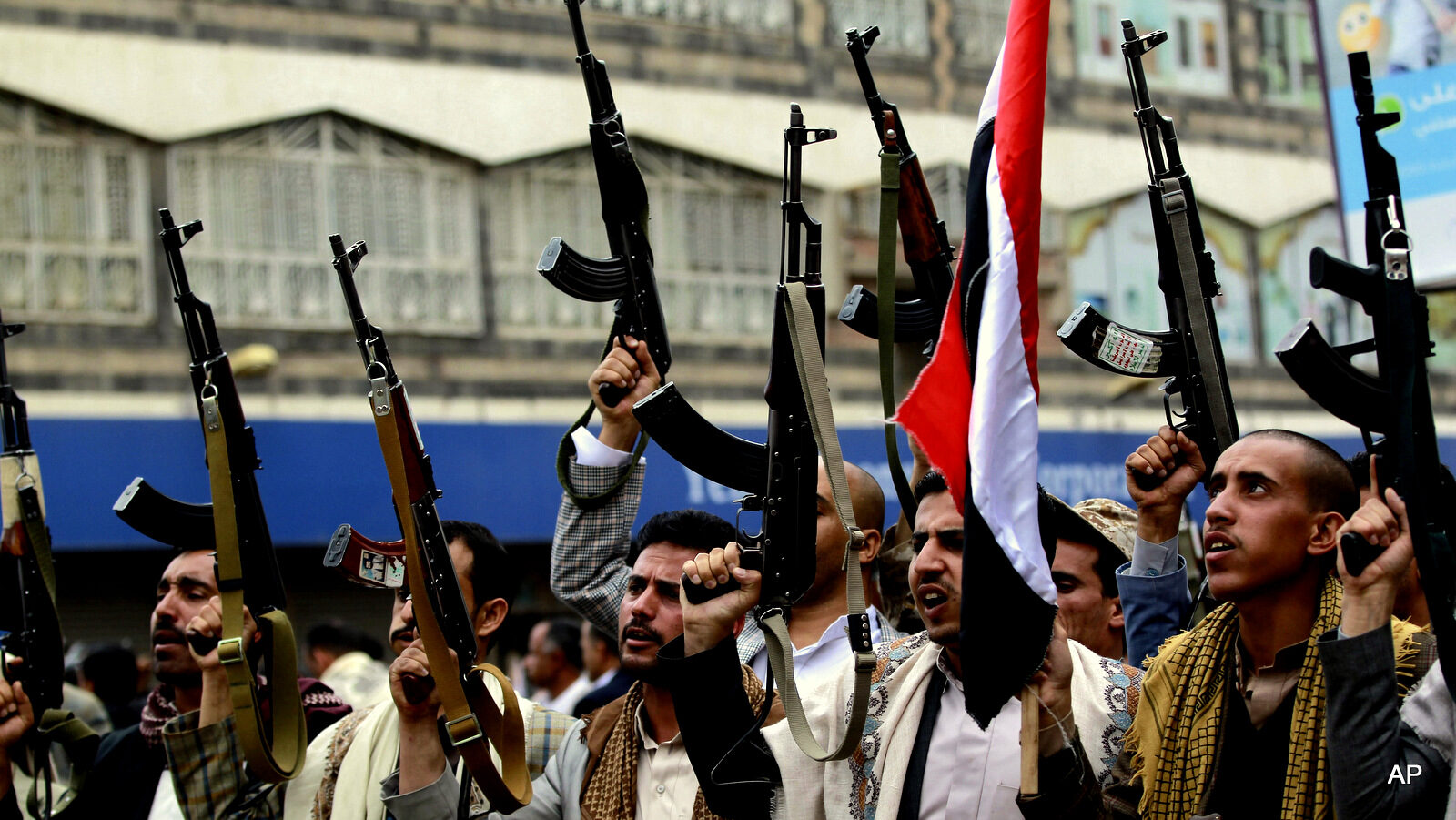 Shiite rebels, known as Houthis, hold up their weapons to protest against Saudi-led airstrikes, during a rally in Sanaa, Yemen, Thursday, March 26, 2015. Saudi Arabia bombed key military installations in Yemen on Thursday, leading a regional coalition in a campaign against Shiite rebels who have taken over much of the country and drove out the president.
Shiite rebels, known as Houthis, hold up their weapons to protest against Saudi-led airstrikes, during a rally in Sanaa, Yemen, Thursday, March 26, 2015. Saudi Arabia bombed key military installations in Yemen on Thursday, leading a regional coalition in a campaign against Shiite rebels who have taken over much of the country and drove out the president.
SANAA, Yemen — As airstrikes in Yemen intensified on their second day Friday, Egypt and Saudi Arabia were considering an intervention on the ground, aimed at giving the president a secure foothold to return to the country, while backing Sunni tribesmen to fight against Shiite rebels and their allies, military officials said.
A likely entry point for troops from the Saudi-led Arab coalition was the southern port of Aden, the Yemeni and Egyptian military officials told The Associated Press. But that could be a tough prospect: The city is already a battleground, and on Friday forces loyal to the rebels’ top ally, former President Ali Abdullah Saleh, were advancing toward it.
The officials’ comments to the AP draw broad outlines for the likely strategy for the ambitious campaign launched Thursday, led by Saudi Arabia with a major role by its ally Egypt. The aim, they said, was to carve out enough room for President Abed Rabbo Mansour Hadi, who was forced to flee the country from Aden, to return. Longer-term, the campaign aims to wear down the Shiite rebels, known as Houthis, and Saleh’s forces, enough to reach a power-sharing accord. The officials spoke on condition of anonymity to discuss the plans.
“The credibility and legitimacy of President Hadi erode with every day he spends outside the country,” said one Yemeni military official. Hadi fled by boat from Aden on Wednesday, making his way to Saudi Arabia, and on Friday arrived in the Egyptian resort of Sharm el-Sheikh for an Arab summit due to start the following day.
The forces of Saleh appear to be a key concern. Saleh ruled Yemen with an autocratic hand for nearly 40 years until he was forced out and replaced by Hadi in 2012 following an Arab Spring uprising. But he remained in Yemen and kept the loyalty of many military commanders. One Yemeni official Friday estimated that 70 percent of the army is loyal to Saleh, including many of the best armed and trained units based around the country.
Those pro-Saleh troops have been fighting alongside the Iranian-allied Houthis, enabling them to take over the capital Sanaa and much of the country over the past months — at least 10 of Yemen’s 21 provinces.
Saudi Arabia and fellow Sunni-led allies in the Gulf and the Middle East view the Houthi takeover as an attempt by Iran to establish a proxy on the kingdom’s southern border. Iran and the Houthis deny that Tehran arms the rebel movement, though it says it provides diplomatic and humanitarian support. Washington says the U.S. is providing refueling tankers and surveillance flights for the Saudi operations, and there are several U.S. troops working in the operations center, but the U.S is not taking direct military action.
A second day of intense airstrikes by Saudi Arabia and its allies hammered Sanaa and five other provinces, hitting bases of units loyal to Saleh. They struck in Saleh’s stronghold of Samhan, outside Sanaa, where Saleh is believed to have fled, and the Houthis’ main stronghold, the mountainous northern region of Saada, where the group’s leader Abdul-Malik Houthi is located.
At least 24 civilians were killed in Friday’s strikes, bringing the toll from two days to 45 civilians, the Houthi-run Interior Ministry said. The Houthis’ TV station showed footage from a market in Saada it said was struck by missiles, with images of charred bodies and wrecked vehicles.
Yemeni security officials said around 80 fighters from Houthi or Saleh forces have been killed in the strikes. The officials spoke on condition of anonymity because they were not authorized to talk to the press. By Friday afternoon, more than 40 percent of Yemen’s air defenses were destroyed, according to Yemeni Brig. Gen. Saleh al-Subaihi, a pro-Hadi officer.
The figures of civilian and combatant casualties could not be independently confirmed.
Also Friday, Saudi and Egyptian warships deployed to Bab al-Mandab, the strategic strait off Yemen at the entrance of the Red Sea, Egyptian military officials said. The strait gives the only access to Egypt’s Suez Canal from the Arabian Sea and is a vital passage for shipping between Europe and Asia.
On his party website, Saleh proposed a cease-fire by the coalition, Hadi’s forces and the Houthis — without mentioning his own — and a return to U.N.-sponsored negotiations.
But all sides appeared to be moving to confrontation in the south. “We are used to long wars,” Houthi spokesman Mohammed Abdel-Salam said. “The situation in the south is much better than before … There is full readiness.”
Militias and military units loyal to Hadi hold much of Aden, but pro-Saleh units control the airport and parts of the city. The two sides clashed in northern neighborhoods on Friday, with snipers firing from rooftops. In a further complication, al-Qaida militants — who have been battling the Houthis — control another northern district on Aden’s outskirts.
On Friday, a pro-Saleh force of dozens of troop carriers from the southern town of Lawdar was heading to Aden, reaching some 80 kilometers (50 miles) outside it. A pro-Saleh military official told AP that Saleh had ordered the force to join loyalists in Aden and secure it before the end of the Arab Summit this weekend. The official spoke on condition of anonymity because he was not authorized to talk the press.
Ahmed Asiri, the Saudi spokesman of the coalition campaign, known as Decisive Storm, told reporters that “the main objective is to protect the government in Aden,” referring to Hadi’s supporters. When asked about the possibility of a coalition ground deployment, he said, “We are supporting the Yemeni army and we will do what it takes to protect the legitimacy of Yemeni government.”
Yemeni Foreign Minister Riad Yassin said there was an “arrangement” for ground troops of the Saudi-led coalition to deploy in Yemen. “It’s a comprehensive military operation,” he told the Saudi-owned Al-Arabiya news channel.
The Yemeni and Egyptian military officials said a ground deployment by troops from Egypt, Saudi Arabia and other allies would come after airstrikes have weakened Houthi-Saleh forces sufficiently. As an alternative to Aden, the forces could deploy further east in Hadramout province, another pro-Hadi stronghold.
At the same time, the coalition is looking to further arm and bankroll Sunni tribes in the north and the south to fight the Houthis, they said. Many of these tribes are already receive considerable Saudi largesse to secure their loyalty.
If Arab troops can secure Aden, they would have to widen the pocket of control further in southern Yemen. Houthis and Saleh’s forces hold several provinces in the area, but they face resistance. In Dhamar and Taiz — two areas overrun by the rebels — thousands of demonstrators staged protests Friday in support of the Saudi airstrikes.
In the southern city of al-Dhale, pro-Hadi militias were fighting Saleh’s forces.
Battles were also going on in the southern city of al-Houta, just north of Aden. There, part of the city is controlled by pro-Hadi militias, another part is controlled by al-Qaida militants, and both were separately fighting Houthi and pro-Saleh forces, Yemeni security officials said.


